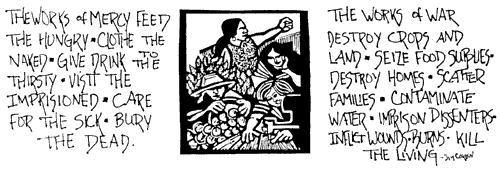
His face, swollen and bruised, contorted as his cries echoed down the street.
“Will SOMEONE help me? What do I have to do to get someone to help me?! Do I have to beat my head against a wall to get someone to help me?”
WHAM! He slammed his face against the wall another time. Everyone jumped a little.
He had been homeless for twenty years, struggling the entire time with under-treated schizophrenia. He used to break windows when he got upset, but as he has grown older he has become more compassionate, more reluctant to harm others. Now he only hurts himself.
Everyone seems to earnestly want to help this young man; everyone wrings their hands when confronted with his struggle.
Yet his cries have a familiar ring… “Will you not watch with me this one hour?”
On the night he was betrayed, Jesus went to a garden to pray. He begged his friends - Peter, James, and John - to come with him, to stay close by as he agonized over his fate. His anxiety was so intense that it was said he “sweated blood”. Christ’s companions were earnest in their love for him. Yet they fell asleep as he contemplated his doom. For, as the scriptures say, “their eyes were heavy.”
Even among all the disciples, Peter was the most sincere. “Though all become deserters, I will never desert you.” Indeed, he had given up his whole life, his career as a fisherman and his family, to follow Christ. Yet he also slept, because he did not fully comprehend the weight of the moment.
Neither do we. Today the homeless sit outside like Lazarus at the gate, waiting to be invited in. As they wait, they are afflicted with illnesses ranging from pneumonia to staff infections. They are called names and are spat upon by passing pedestrians. They are exposed to the weather, and as they attempt to shield themselves from the elements they are persecuted for illegal camping. They are turned away from overburdened services, and are told that they alone are responsible for their plight.
The government will not provide a solution. I heard as much at a recent Human Services Review Council meeting, which is made up of representatives of local governments. Fuel prices are going up, making it difficult for officials to maintain even the most basic infrastructure. And if local governments balk, the federal government does so even more. The Housing Authority recently received notice of deep budget cuts, and has had to significantly scale back its housing voucher program. The wait list for a voucher stretched out six years even before the cuts were announced.
Yet even if the government can do so little, hope is not lost for the homeless. There is another answer.
Are we not asked to “share your bread with the hungry, and bring the homeless poor into your house”? (Isaiah 58:7) For every person experiencing homelessness in our community, there are two hundred unoccupied living room couches. If we want for shelter and housing we have our very own homes to offer. If we are frightened of being overwhelmed and want for support, we have seminaries and universities packed full of idealistic men and women who want nothing more than to make a difference.
Yet we sleep. And as we, the slumbering masses, wait for the government to act, Christ cries in Gethsemane.
Many of us want the Church to do more. Yet we forget what the Church is. We think of the church building, the clergy and staff, and we see ourselves as mere volunteers in the church programs. But we are the Church - the hands and feet, eyes, ears, and mouth of the universal living Church. And if we are the Church, then our homes are where the Church truly resides. Our only obstacle to serving Christ is the weight of our own eyes.
I went to the hospital last night with a young, pregnant homeless woman. She told me she had lived in scores of foster homes – starting at the age of five – prior to becoming homeless. When her baby is born, it will be one more among the six hundred fifty four children experiencing homelessness in our community. A few of these children live in shelters, many sleep in cars, many more live in the Capitol Forest. They are unseen; the details of their difficult lives are largely unknown to the rest of us. They are waiting for us to wake up.
Please listen now. Listen close. Lend your ear to that little voice welling up from inside you. It may be faint, but if you listen carefully you will hear it. It is saying, “Wake up, Peter. Wake up, because I am with you. Wake up, because I have chosen you. Wake up, because I will make you the rock upon which I will build a new world… a world founded on Love. Wake up.”
Wake up, because Christ is among us. He is waiting for you.



